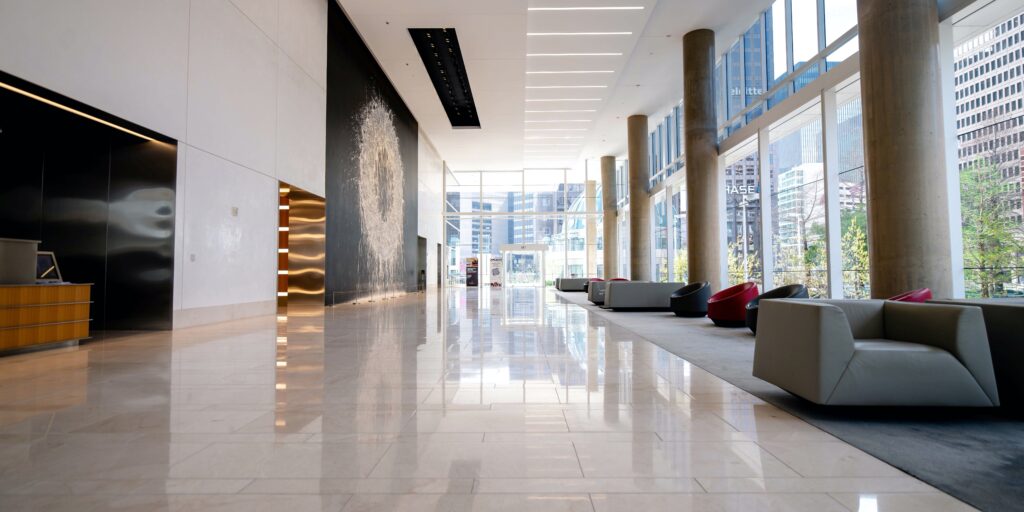City and county officials can find sustainable solutions at their feet
Dave Darche, a flooring industry expert at Bona, says flooring as well as flooring maintenance can be big parts of city-county sustainability efforts. “Remember your agency building’s flooring when thinking sustainably. Municipal facilities require clean, durable and slip-resistant floor surfaces to accommodate the large numbers of employees, visitors and other dignitaries passing through on a daily basis. Today, there are eco-friendly and sustainable options available on a variety of budgets.”
Darche, who is national market manager of adhesives for the architect and design community (A&D) at Bona, says building managers have a useful tool that can help keep government operations going smoothly. “They can keep government business and events running on schedule by implementing a floor renewal and maintenance system that is eco-friendly and quick.”
There are processes and mechanisms out there that can simplify maintaining floor surfaces, Darche tells Co-op Solutions. “Thanks to technology advancements that offer durability and modern floor design options, municipalities are creating welcoming areas that withstand heavy foot and mechanical traffic. A government facility operating on a minimal budget can erase years of flooring use with a modern design on a renewed floor.”
He adds that the process can be a game-changer for public sector building managers.” Flooring renewal is an efficient and cost-effective solution that is easy to maintain—with proper training and use of high-quality products. Once maintenance teams have an understanding of the dos and don’ts of maintaining the new surface, upkeep is a sustainable, low-cost and fairly simple process.” He adds that the lower-maintenance renewal option for heavily used flooring offers a key advantage. It can endure the outside weather elements and wetness that heavy foot traffic and rolling carts may bring into the facility.
No question, there are environmental benefits when floors are updated responsibly. “Flooring renewal offers a long-lasting floor that uses existing materials, keeping trash out of the landfill and eliminating the carbon footprint that comes with new floor materials,” Darche explains. He adds that the renewal process is typically completed in a matter of hours (depending on surface size). “That way there is no need to wait for government holidays, pay maintenance teams overtime to work at night, or to close sections of the facility for floor upkeep.”
And yes, science has provided tools that can help save the environment. “Waterborne market solutions (i.e., products used during the flooring renewal process), are now an industry standard. They offer a sustainability benefit of decreasing the amount of toxic stripper and other environmentally harmful products used on flooring projects,” Darche explains. He adds that flooring renewal uses existing materials, mitigates the landfill issue and eliminates the carbon footprint created by new products. “Plus, environmental certifications are an option for reuse of existing products.”
Darche offers some words of advice for maintaining renewed flooring:
- Become educated on options. Besides his firm, Darche suggests that building managers consult with and use the resources of the Resilient Floor Covering Institute (RFCI) when they are contemplating a floor renewal or replacement.
• Work only with maintenance teams who are properly trained for the particular flooring surface upkeep.
• Develop a maintenance plan and follow that plan.
• Use floor mats in high traffic areas to capture dirt. Clean or swap out the mats frequently so captured dirt won’t be tracked onto the flooring surface.
• Consider the total cost of ownership: Flooring tends to deteriorate from heavy traffic, spills, scratches or dents from equipment, furniture, heat, cleaning agents (especially during COVID) and moisture. Evaluating the cost of the total system throughout its lifetime, as well as the environmental impact of frequent stripping, are both important considerations.
On the sustainability front, Darche suggests choosing 100-percent water-based non-toxic chemistries, so indoor air quality remains safe for employees and visitors, and to choose a renewal solution that eliminates the need to ever strip the floor again. This will help avoid the harmful dust and toxins created by the stripping and polishing process.
Yes, government budgets are tight, Darche tells Co-op Solutions. “Flooring renovation may seem an insurmountable challenge, and purchasers opt to replace the flooring surface instead. As a result, municipal facilities contribute to rising landfills and use funds that could be utilized for other facility operational needs. What’s even more commonplace is administrators opting to ‘live with it because a new floor isn’t in our budget.’”
He says a sustainable solution is available and ready to install. “Flooring renewal creates a long-lasting floor, utilizes existing materials, keeps trash out of the landfill and eliminates the carbon footprint created by new products. Municipalities are also an excellent place to model sustainable practices by renewing instead of replacing flooring.”
OMNIA Partners offers a robust portfolio of cooperative contracts in the public procurement space. OMNIA Partners Public Sector lists more than a dozen cooperative contracts for flooring and related products under the keyword “flooring.”
Michael Keating is senior editor for American City & County. Contact him at [email protected].


















